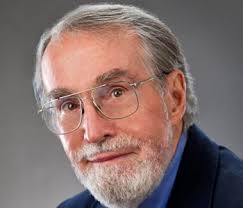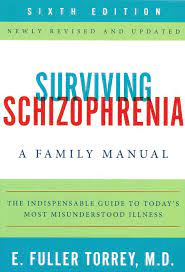
Dr. E. Fuller Torrey, founder Treatment Advocacy Center
(3-15-22) I heard about mental health advocate June Judge before I met her several years ago. She was well known in mental health circles for her tenacity and get-to-work attitude. Her son, Michael Judge, a former editor at The Wall Street Journal, has launched his own subscription newsletter and he recently sent me an interview that he conducted with the legendary and always controversial Dr. E. Fuller Torrey, founder of the Treatment Advocacy Center. Mr. Judge graciously allowed me to reprint the interview in two parts.
The Man Who Helped Millions, Including My Family, ‘Survive Schizophrenia’
A conversation with Dr. E. Fuller Torrey, author of “Surviving Schizophrenia: A Family Manual.” He’s a rare find in today’s medical world—a psychiatrist who refuses to give up on the most severely ill.
 |
By Michael Judge (This article first appeared on The First Person With Michael Judge)
It’s not often that you can look back on your life and say, with certainty, this person saved my life. But that’s how I feel about Dr. E. Fuller Torrey, the world-renowned psychiatrist and best-selling author known to friends simply as Fuller.
Back in April 1983, when Fuller’s groundbreaking book Surviving Schizophrenia: A Family Manual was first published, I was a 16-year-old kid who had just lost two of his greatest heroes to schizophrenia.
My brother Steve was battling the horrific symptoms of the brain disease—delusions, hallucinations, severe paranoia—after being diagnosed with schizophrenia in 1979 while a third-year cadet at the Air Force Academy. My brother John, a star football player with a full-ride scholarship to the University of Iowa, took his own life just six months before the first printing of Surviving Schizophrenia, after he too was struck down by the disease in a landslide of delusions, shame, and despair.
It was Fuller and my mother, June Judge, a fierce advocate for those suffering from the most severe forms of mental illness, who together saved my life.
Fuller had come to Waterloo, Iowa, to talk about his book and help families like mine literally “survive” schizophrenia. That evening, in the summer of 1983, just before my 17th birthday, I heard for the first time someone in the medical profession talking in medical terms about schizophrenia, and how it wasn’t the result of something that we had done. It was a medical disease just like diabetes or cancer.
Nearly 40 years later, my mother still talks about how my anger began to subside that evening on the ride home from Fuller’s talk. She knew then that we would survive the overwhelming loss our family—including my two other siblings, David and Katherine, as well as my father and grandparents and all who knew Steve and John—were feeling in the wake of my brothers’ schizophrenia diagnoses and their fight to survive,
Surviving Schizophrenia is now in its seventh edition, containing vital updates on new medicines and treatments and research into the causes of the disease. It remains the Old and New Testament for families and individuals struggling to help loved ones battling the severest forms of mental illness. 
Over the past four decades, Fuller has published 19 more books, ranging from 2008’s The Insanity Offense: How America’s Failure to Treat the Seriously Mentally Ill Endangers Its Citizens, to 2017’s Evolving Brains, Emerging Gods: Early Humans and the Origins of Religion.
Despite his prolific output, writing books has always been a side gig for Fuller, who turned 84 this September. He’s devoted his life to research psychiatry, specializing in schizophrenia and bipolar disorder, and to being an outspoken advocate for those suffering—whether in psych wards, on the streets, or behind bars—from the most debilitating forms of mental illness. In 1998, with the assistance of the Stanley Medical Research Institute, he founded the Treatment Advocacy Center (TAC), a nonprofit dedicated to eliminating legal and other barriers to the treatment of severe mental illnesses.
I spoke with Fuller from his home in Bethesda, Md., on a cold, February afternoon. It was good to hear his voice, despite it being weakened from his ongoing battle with Parkinson’s Disease.
MJ: Fuller, I hope you’re feeling well today.
EFT: I’m not doing badly.
Believe it or not, you and I first met nearly 40 years ago in 1983. I think the same year that Surviving Schizophrenia was published.
We were younger then.
Well, I was 16 years old . . . I was 16 and my mother put me in the car, forced me to get in the car and drove me to Waterloo, Iowa, to hear you speak.
I was giving a lot of talks at that time to the NAMI [National Alliance on Mental Illness] groups.
Well, I don’t know if I’ve told you this before, but when I heard you speak, it was right after my brother John had taken his own life after being diagnosed with schizophrenia. And my brother Steve was very sick. And when I saw you talking in medical terms about schizophrenia, and how it wasn’t the result of something that we had done or ‘bad character’ or being an immoral person, but rather it was a medical disease just like diabetes or cancer, that really changed my life, and I’ll never forget that.
That’s very gratifying to know.
Yeah. I remember I felt like I’m not alone, there are other people like this, that my brother is not evil. He’s not possessed by the devil and it wasn’t a lack of character that led to his disease.
This was a time when the medical aspects of the disease were just becoming clear. And in retrospect, it seems strange what people believed at that time. But, you know, people really did believe that it was caused by evil and not associated with brain disease. So establishing it as a brain disease was a very important thing to do.
Yes. And especially for parents—mothers in particular. Like my mother, who at that time they blamed. Especially psychologists, influenced by Freud, they blamed mothers quite often. Didn’t they?
Yeah. Mothers were often blamed and it was very difficult on them. Certainly, my mother also was blamed for my sister’s schizophrenia and it is very, very cruel to do that.
Well, I’d like to talk to you about your family. But first I wanted to say that there’s a friend of mine who is a philosophy professor, a close friend, and we often talk about Heraclitus’ axiom, “Character is destiny.” And I’ve always felt that it was such a very cruel notion, especially for someone suffering from severe mental illness or schizophrenia.
Right.
Because my brother was brilliant. My brother, Steve, was very brilliant at the time he was diagnosed with schizophrenia. He was in the Air Force Academy and he could have become an astronaut or a politician or a scientist—and his character was flawless, you know?
It’s very, very sad. Unfortunately, the disease affects people at all levels and it’s very, very hard on the family.
So when did you first experience it in your own family? Were you a young man or a child? When did your sister first get diagnosed and how did that change your life?
I was in college at the time, Michael, and my mother reported what was happening at home. My sister just graduated from high school and was scheduled to go to college in the fall in upstate New York, and then developed hallucinations, delusions during the summer—a classic onset of quite severe schizophrenia. So I got involved right away because my father died and it was just my older sister and myself and my younger sister. I got involved to help the family. My mother had a high-school education, but she had no background in mental health at all—like most families, like yours also, I think. Nobody had ever trained them or taught about anything like this. So they really didn’t know what to do.
Did you go back and try to take care of her, or did you help out the family to try to figure out how to get help for her?
Yes. I tried to get help for my mother. My sister went to New York for evaluation at Columbia, and to Boston. I went with my mother and sister, too. My sister was hospitalized in several hospitals, and I visited the hospitals. I was just trying to be supportive of my mother and help advise her what we should do.
And so then you were in college, and did you then decide to go into medicine and then go into psychiatry? Or had you already decided that?
No. I was in a pre-med course. I was studying to become a physician, but I was thinking of doing general practice, family practice. And so my sister’s experience certainly drove me towards psychiatry when I realized what was going on and how little we knew, and how serious her disease was. So that was the beginning of my interest in psychiatry, no question about it.
Did you have a difficult time finding care for her?
She had a severe form of schizophrenia. Males often have a more severe form than females, but she was in the category of quite severe. So she ended up, after going to several private hospitals, in the state hospital, and was actually hospitalized continuously in state hospitals for 25 years before she was finally moved into the community. So she was not able to . . . her response to medication was only fair and she had quite severe symptoms. She was just 18 when she first got sick.
And how old was she when she passed away?
She was 70.
Part Two: Michael Judge’s interview with Dr. E. Fuller Torrey continues tomorrow. The views expressed in guest blogs are those of the guest author.)
About the author:



